
CHINESE JOURNAL OF INORGANIC CHEMISTRY
metrics 2024
Connecting Scholars through Inorganic Innovations
Introduction
The CHINESE JOURNAL OF INORGANIC CHEMISTRY, published by the esteemed CHINESE CHEMICAL SOC, stands as a pivotal resource for researchers and professionals in the field of inorganic chemistry. With an ISSN of 1001-4861, this journal has been disseminating cutting-edge research since its establishment in 1996 and continues to influence the scientific community with its commitment to high-quality publications. Although currently classified in the Q4 quartile for Inorganic Chemistry and ranked 70th out of 79 in its category according to Scopus, the journal serves as a platform for innovative studies that push the boundaries of inorganic materials and compounds. While it operates on a traditional access model, the journal is dedicated to fostering scientific discourse and collaboration among scholars in China and beyond, making it an essential reference for anyone involved in inorganic chemistry research.
Metrics 2024
 0.19
0.19 0.80
0.80 0.50
0.50 30
30Metrics History
Rank 2024
Scopus
IF (Web Of Science)
JCI (Web Of Science)
Quartile History
Similar Journals

Nature Synthesis
Catalyzing Breakthroughs in Chemical MethodologiesNature Synthesis, published by SpringerNature, is a premier peer-reviewed journal dedicated to advancing the field of synthesis in chemistry and materials science. With an impressive impact factor and categorized in the Q1 quartile for Chemistry (miscellaneous), Inorganic Chemistry, Materials Chemistry, and Organic Chemistry, it ranks prominently among its peers, reflecting its high-quality research output and relevance.
This journal provides a platform for researchers, professionals, and students to publish innovative synthesis methodologies, novel materials, and interdisciplinary approaches that push the boundaries of chemistry. Operating under an Open Access model, it ensures that research is widely accessible, fostering collaboration and engagement across the global scientific community.
Situated in the United Kingdom, Nature Synthesis is committed to contributing to the scientific discourse from 2022 to 2024, and beyond, as it continues to highlight significant advancements across chemistry domains.

Inorganic and Nano-Metal Chemistry
Empowering Researchers with Open Access to Cutting-Edge Chemistry.Inorganic and Nano-Metal Chemistry is a premier journal published by Taylor & Francis Inc, focusing on innovative research and advancements in the fields of inorganic chemistry and nano-metal applications. With an increasing impact in the academic community, this journal has established itself within the Q3 category of both Inorganic Chemistry and Physical and Theoretical Chemistry as of 2023, reflecting its global recognition and influence. The journal is accessible as an Open Access publication, ensuring that research findings are freely available to a broad audience, promoting transparency and collaboration in scientific exploration. Based in the United Kingdom, Inorganic and Nano-Metal Chemistry aims to disseminate high-quality peer-reviewed articles that not only highlight fundamental studies but also push the boundaries of technological applications in areas such as catalysis, materials science, and nanotechnology. Researchers, professionals, and students will find this journal an invaluable resource for the latest developments and interdisciplinary insights in the ever-evolving landscape of inorganic and nano-metal chemistry.
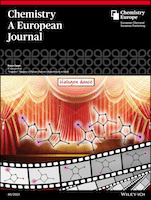
CHEMISTRY-A EUROPEAN JOURNAL
Connecting Researchers to the Heart of Chemical AdvancementsCHEMISTRY-A EUROPEAN JOURNAL is a premier academic journal published by WILEY-V C H VERLAG GMBH, specializing in the diverse fields of chemistry and catalysis, with a distinguished focus on organic chemistry. Since its inception in 1995, the journal has established itself as an authoritative resource for researchers and professionals, currently classified in Q1 in Chemistry (miscellaneous) and Organic Chemistry, reflecting its high-quality contributions to the scientific community. With an impressive impact factor and robust Scopus rankings—#33 in Organic Chemistry and #26 in Catalysis—this journal serves as a vital platform for disseminating innovative research findings and critical advancements in chemical sciences. Although not an open-access journal, it provides valuable access options for institutions, ensuring wide reach and engagement within the scientific community. As it converges into 2024, CHEMISTRY-A EUROPEAN JOURNAL remains a key resource for anyone dedicated to advancing the frontiers of chemistry research.

JOURNAL OF STRUCTURAL CHEMISTRY
Bridging Innovation and Tradition in Structural ChemistryThe JOURNAL OF STRUCTURAL CHEMISTRY, published by PLEIADES PUBLISHING INC, is a premier resource in the fields of Inorganic Chemistry, Materials Chemistry, and Physical and Theoretical Chemistry. Established in 1960, this journal has been providing a platform for groundbreaking research, facilitating the advancement of knowledge and innovation up to the year 2024. With an ISSN of 0022-4766 and an E-ISSN of 1573-8779, this journal strives to maintain high academic standards, as evidenced by its quartile rankings in 2023, where it ranks Q4 across various chemistry categories. While it currently does not offer open access, the journal's insightful articles are crucial for professionals and students seeking to enhance their understanding and expertise in structural chemistry. Subscribers can expect a comprehensive collection of peer-reviewed research, empirical findings, and theoretical discussions that contribute significantly to the scientific community. With its strong historical foundation and ongoing commitment to quality, the JOURNAL OF STRUCTURAL CHEMISTRY continues to be an essential resource for those passionate about the complexities of structural chemistry.
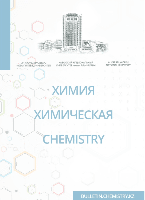
Chemical Bulletin of Kazakh National University
Catalyzing Ideas in the World of ChemistryThe Chemical Bulletin of Kazakh National University is a prominent open-access journal dedicated to advancing the field of chemistry. Published by AL-FARABI KAZAKH NATIONAL UNIVERSITY, this journal serves as a vital platform for disseminating original research, reviews, and innovative findings in diverse areas of chemistry since its transition to open access in 2012. With an ISSN of 1563-0331 and an E-ISSN of 2312-7554, the journal aims to reach a global audience, fostering knowledge exchange among researchers, professionals, and students in the scientific community. The publication seeks to promote high-quality research that contributes to the understanding and application of chemical sciences, particularly in the context of Kazakhstan and the broader Central Asian region. Given the journal's commitment to making research freely accessible, it stands as an invaluable resource for anyone engaged in the study and application of chemistry.
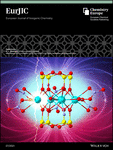
EUROPEAN JOURNAL OF INORGANIC CHEMISTRY
Unveiling New Horizons in Inorganic ChemistryThe EUROPEAN JOURNAL OF INORGANIC CHEMISTRY, published by WILEY-V C H VERLAG GMBH, is a premier peer-reviewed journal dedicated to advancing the field of inorganic chemistry. With an ISSN of 1434-1948 and an E-ISSN of 1099-0682, this journal has established itself as a key platform for the dissemination of innovative research, reviews, and features since its inception. As of 2023, it holds a respectable Q2 quartile ranking in the domain of inorganic chemistry, reflecting its influence and contribution to the scientific community—ranking #33 out of 79 in Scopus’ assessment and placing the journal in the 58th percentile. The journal encompasses a wide range of topics within inorganic chemistry, making it a valuable resource for researchers, professionals, and students alike. Although the journal does not currently offer open access, it remains an essential outlet for high-quality, impactful studies in inorganic chemistry, showcasing significant advancements and fostering collaboration among scholars globally.

INORGANIC MATERIALS
Catalyzing Discoveries in Inorganic Chemistry and EngineeringINORGANIC MATERIALS, published by MAIK NAUKA/INTERPERIODICA/SPRINGER, is a pivotal journal in the realm of Materials Science, focusing primarily on the exploration and application of inorganic materials. With a robust commitment to advancing knowledge in areas such as Metals and Alloys, Inorganic Chemistry, and Chemical Engineering, this journal has successfully maintained a reputation for quality, achieving various category quartiles in 2023, including Q3 in Chemical Engineering and Materials Chemistry, and Q4 in Inorganic Chemistry. Although it operates under traditional access models, the journal welcomes contributions from researchers dedicated to understanding the properties and applications of inorganic substances. Throughout its publication history from 1996 to 2024, INORGANIC MATERIALS has become an essential resource for those engaged in innovative research and development, making it an invaluable tool for students, professionals, and academics alike.
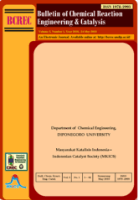
Bulletin of Chemical Reaction Engineering and Catalysis
Fueling Knowledge in Chemical Processes and Catalytic InnovationsBulletin of Chemical Reaction Engineering and Catalysis is a distinguished open-access journal published by UNIV DIPONEGORO, focusing on pivotal advancements in the fields of chemical reaction engineering and catalysis. Since its inception in 2008, this journal has served as a vital platform for disseminating cutting-edge research, catering to a diverse readership that includes researchers, professionals, and students in chemical engineering and related disciplines. With its dedication to publishing valuable insights, the journal has been indexed in Scopus and boasts respectable rankings across various categories, including Q3 in Chemical Engineering (miscellaneous) and Q4 in Catalysis as of 2023. It continues to foster scholarly dialogue and collaboration by providing an accessible means for contributors to share their findings. Operating from Semarang, Indonesia, this journal underscores its commitment to advancing knowledge in chemical sciences, making it an essential resource for those engaged in the study and application of chemical processes.

ACS Organic & Inorganic Au
Empowering Global Knowledge Exchange in ChemistryACS Organic & Inorganic Au, published by the American Chemical Society, stands as a premier open-access journal dedicated to advancing the fields of organic and inorganic chemistry. Since its inception in 2021, this journal has swiftly risen to prominence, achieving a commendable Q1 classification in Inorganic Chemistry, Organic Chemistry, and Physical and Theoretical Chemistry as of 2023. With an ISSN of 2694-247X, it provides a vital platform for researchers, professionals, and students to disseminate their findings and engage with cutting-edge work across converged disciplines. Operating from its headquarters in Washington, DC, ACS Organic & Inorganic Au is committed to fostering a collaborative research environment, encouraging rigorous peer review, and ensuring the wide accessibility of high-quality scholarly articles. With its open-access model, readers worldwide can freely access and utilize research findings, promoting a global exchange of knowledge crucial for driving innovation in chemistry.
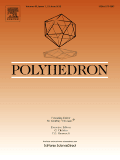
POLYHEDRON
Unveiling the Complexities of Molecular Structures.POLYHEDRON is a prestigious academic journal published by Pergamon-Elsevier Science Ltd, specializing in the fields of Inorganic Chemistry, Materials Chemistry, and Physical and Theoretical Chemistry. With its ISSN 0277-5387 and E-ISSN 1873-3719, the journal has been a significant outlet for groundbreaking research since its inception in 1982 and continues to be influential for scholars and practitioners. As of 2023, it holds a Q3 quartile ranking across its categorization, underscoring its impact within the scientific community with respectable Scopus Rankings that place it in the top percentiles of relevant fields. Situated in the United Kingdom, POLYHEDRON aims to foster the exchange of innovative ideas and findings related to polyhedral molecules and structures, making it an essential resource for researchers seeking to expand their knowledge and contribute to these dynamic areas of study. While currently not an Open Access journal, it remains committed to advancing education and research by providing quality content that serves both academic and practical applications.